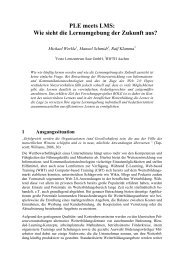Customized PLE implementations for test-bed scenario ... - ROLE
Customized PLE implementations for test-bed scenario ... - ROLE
Customized PLE implementations for test-bed scenario ... - ROLE
Create successful ePaper yourself
Turn your PDF publications into a flip-book with our unique Google optimized e-Paper software.
Consequently, the deliverable deals with important aspects concerning this practice<br />
sharing approach, like privacy and trust, the dimensions of capturing learner<br />
interactions, competence development issues, etc., and proposes an infrastructure to<br />
enable good <strong>PLE</strong> practice sharing on different kinds of <strong>PLE</strong> solutions (plat<strong>for</strong>ms and<br />
client-sided prototypes).<br />
Community evaluation methodology<br />
The evaluation of this community-based bottom-up approach can be achieved through<br />
very different aspects, which are manifested in <strong>ROLE</strong> deliverables or declared as next<br />
steps in the project.<br />
On the one hand, the internal deliverable ID6.3/ID6.4 (‘Draft evaluation methodology<br />
from the technical, usability and psycho-pedagogical perspective including guidelines <strong>for</strong><br />
the empirical realisation’) summarise generic methodologies (plus factors and methods)<br />
<strong>for</strong> evaluating the success of in<strong>for</strong>mation systems, technology acceptance, and<br />
motivation and Community of Practice (CoP) success. Here, also aspects from<br />
evolutionary biology would be of interest. For instance, the usage of <strong>PLE</strong>s and single<br />
tools could be examined on basis of a Darwinist model, leading to the evaluation of the<br />
evolvability and fitness <strong>for</strong> purpose of <strong>PLE</strong> technologies in CoPs. A workshop to be held<br />
in March 2011 (cf. http://augur.wu.ac.at/EFE<strong>PLE</strong>11/) will address this special topic.<br />
Additionally, trust and privacy are tackled but not explored in detail. Particularly <strong>for</strong><br />
capturing interaction data, it is necessary to consider privacy while applying new <strong>PLE</strong><br />
technology and generating recommendations require trustful software.<br />
On the other hand, the community-driven <strong>PLE</strong> approach by WP7 requires also the<br />
evaluation of typical Web 2.0 issues, like the quality of user-given input (Folksonomies),<br />
the accuracy and novelty of <strong>PLE</strong> recommendations, or the dynamics and structure of<br />
networked collaboration and the CoPs themselves. Furthermore, the <strong>PLE</strong> practice<br />
sharing approach documented in the deliverable D7.2 enables the evaluation on the<br />
basis of concrete data available in the pattern repository, e.g. by analysing the number<br />
of activity patterns shared, explicit user feedback on activities and activity outcomes,<br />
etc. Regarding these considerations, work has started in the second year of the <strong>ROLE</strong><br />
project. First results have been published e.g. at the Workshop on Recommender<br />
Systems <strong>for</strong> Technology Enhanced Learning (Manouselis et al., 2010) and the<br />
EFE<strong>PLE</strong>’11 Workshop (see above).<br />
Test-<strong>bed</strong> validation strategy<br />
In order to validate the community considerations of <strong>ROLE</strong>, the following questions are<br />
supposed to be answered by the <strong>test</strong>-<strong>bed</strong> responsible and/or selected learners:<br />
• How can learning activities be characterised in the <strong>test</strong>-<strong>bed</strong>? Is learning restricted<br />
by the boundaries of an organisation? How is it restricted? Describe the<br />
restrictions given by the boundaries of an organisation! Is learning restricted by<br />
the boundaries of a context? How is it restricted? Describe the boundaries given<br />
by the context! Do learners elaborate the outcomes on their own or do they have<br />
to collaborate with others? Are they involved in passive lecturing activities, or are<br />
Page 14 of 102



